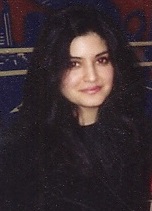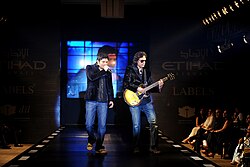New wave of music and New genres (1980-2000s)
The Queen of disco-pop: Nazia Hassan

In 1980, Nazia Hassan, a fifteen-years-old Pakistani girl residing in the United Kingdom was approached by Indian actor and director Feroz Khan along with Biddu Appaiah, an Indian music producer who asked her to sing the song "Aap Jaisa Koi" for the film Qurbani . [13] She was selected for the nasal quality of the song's delivery. The song became an instant hit in the UK and the Indian sub-continent. Influenced primarily by disco beats and hip hop, Nazia along with her brother Zohaib Hassan produced successive hits. Their songs Disco Deewane and Tere Qadmon Ko became the rage all over Asia to the extent that their very first album was declared the best selling album of the time in Asia.
The hype did not last for long as with Muhammad Zia-ul-Haq's regime came drastic decisions to Islamicise the nation. Almost all music videos were banned to air on local television. [13] The religious leaders found the two Hassan siblings dancing together on the stage most un-Islamic. When shown the videos would feature Nazia waist-up to hide her dancing feet. [13] Hence, this came as another blow to the music industry.
Rock music and Zia years (1980–1989)
Despite Zia's tough rhetoric against the Western music, the 1980s era is the widely regarded times of birth and rise of Pakistan's homegrown and ingenious rock music. Immediately following the military installation of Muhammad Zia-ul-Haq as president, measures were taken to put in place to limit the distribution of music and the only source of entertainment was the government-owned television network Pakistan Television Corporation (PTV). [14] A state of the union speech to the public in 1979, President Zia denounced the Western culture and Western music and banned all the music videos in the country. [14]
Despite the hardship and problems faced by the music industry, the siblings, Nazia and her younger brother Zohaib Hassan, teamed up to produce more pop albums, but in the turmoil that Pakistan was headed through, the duo lost viewership and sales in their own country. They managed to reach UK Top 40 with the English version of their song " Disco Deewane " titled "Dreamer Deewane". The album sold over 14 million records, not only in Asia but as far as South America, South Africa and Soviet Union. Nazia Zoheb later produced many other albums in the 1980s e.g., Boom Boom (1982), Young Tarang (1984), Hotline (1987), and Camera Camera (1992) and completely dominated the Pop music scene of Asia during the 1980s. [12]
A new rage of Pop/ rock music, began to rise during the regime of President Zia-ul-Haq. Throughout the 1980s, there was a popular wave of cultural change and the 80's fashion hair styles and clothing was beginning to be noticed by the public. [15] The homegrown rock music bands, out of ordinary to the culture, came to be perceived by many Pakistani fans and country's cultural observers as a "promising new era of cultural revival". [15] Their enormous popularity significantly opened a new wave of music and a modern chapter in the history of Pakistan. [15] The public generally welcomed the new hair styles and fashion wear (popular among university female and male students). [15]
During the peak and end times of Zia's conservative regime, there was a popular wave of cultural change, and the Western fashion style and music stormed the country. [14] In the 1980s, various music arrangers held underground rock music concerts in the five-star hotels and university campuses. [14] Ironically, it was the conservative regime of President Zia-ul-Haq when the rock music exploded and underground rock music concerts were held all over the country, including Islamabad and near the residence of Zia-ul-Haq. [14] In 1986, the pop band, Vital Signs, released its very first singles Dil Dil Pakistan and, Do Pal Ka Jeevan, which became an ultimate success in the country. [16]
The success of Vital Signs helped others to follow their suit, and the rock music in the country skyrocketed for the first time in the history of the country. In a time when there was no hope for the industry to survive, rock/pop music bands notably and much quickly filled the gap that the pop music industry had left. [17] According to the Western observers and cultural critics, the rock music bands in the country brought the significant shift of country's transformation into modernism during the 1990s. [18] With the rise of Vital Signs and later, Junoon and others, the rock music, exploded in the 1980s and 1990s, became a vehicle for expressing patriotic nationalist spirit in Pakistan. [17]
In 1990, the first privately owned television station, the Network Television Marketing (NTM) opened up introducing shows aimed at the younger generation. Prior to that, in 1989, Shoaib Mansoor produced a show for PTV called Music '89 and took the Hassan siblings as the show's host. This show is responsible for single-handedly creating legends out of bands like Vital Signs, Junoon, Ali Haider, Sajjad Ali and Jupiters also including underground alternative rock bands like Final Cut and The Barbarians. [19] According to the editorial written in The Express Tribune in 2011, the "Vital Signs and Pakistan's ingenious rock music was the only "arsenal" the country had against India's encroaching entertainment industry." [20] It was during the midst of Zia times, when Dil Dil Pakistan was released on television and on a short time period, it became a huge success in the country. [21] [7]
The heyday of Pakistan pop music (1990–onwards): emergence of bands and popular singers

With the success of Vital Signs and other bands, pop/rock music significantly helped to list pop music as well. The primetime reception on NTM in Lahore, Karachi and Islamabad as NTM broadcast a show titled Music Channel Charts. The rock music continued to be appreciated by the public and an hour-length show that showcased music videos for various artists in a countdown format. When people started getting acquainted with the show's format, amateur bands and singers taped their own videos and sent them to be aired. With competition rising and only a few minutes dedicated to a single video, pop and rock musicians from all over the country were being recognised for their work. [12]
The show made upcoming artists such as rapper Fakhre Alam, Danish Rahi, Fringe Benefit (the debut album Tanhai was recorded and mixed by Tahir Gul Hasan at his recording studios in Karachi), Strings, Junoon, Aamir Saleem, Aamir Zaki, and Haroon Rashid and Faakhir Mehmood from Awaz household names.The show became the trailblazer and many followed its footstep. Video Countdown (which later became Video Count Down Zabardast Zabar Duss/10) started on PTV and Video Junction (VJ) was one of its kind on NTM which started after the closure of MCC. As PTV became international in 1992 with the launch of PTV2, it opened the international arena for Pakistani Pop artists. More and More International TV channels (especially from across the borders) became visible in Pakistan through satellite. Pakistani artists started making their ways to MTV India and Channel V in the late 1990s. [22] and overshadow every effort the Pakistani counterpart would make to highlight the talents within.
The beginning of FM radio in the mid-90s made Pakistani pop more available. People started enjoying the shades of Paki Pop n rock in their cars.
Recording companies like EMI Pakistan, Pepsi Pakistan Inc. and Sound Master started taking note of the new and rising stars. They started signing contracts with bands including Strings, Vital Signs, Junoon, Benjamin Sister, and Awaz who would later become iconic pop-rock bands. At this time, various rock/pop bands earned a lot of recognition abroad after Vital Signs made its debut international concert in the United States in 1993. [7] [12]
Abrar-ul-Haq, since his debut with Billo De Ghar (1995), became known as the "King of Pakistani pop and bhangra", having sold over 40.3 million albums worldwide. [23] [24] [25] [26]
Hadiqa Kiani made her debut in Adnan Sami & Zeba Bakhtiar starrer "Sargam" in 1995 which became a phenomenal hit and the music album of the movie was a chartbuster in Lollywood Top 10 (PTV), Yeh Hai Filmi Dunya (NTM) and FM channels. But Hadiqa continued her music career more as a pop artist instead of a playback. Her albums "Raaz, Rung and Roshni" sold millions and made her an ultimate female pop star after Nazia Hassan. [27] [28] In 1997, Hadiqa became the second international female singer in the world to be signed by Pepsi Pakistan.
In 1999, following the Kargil War, all Indian channel broadcasts were limited or banned in Pakistan and after Pervaiz Musharraf's coup d'état, the media was privatised. To cater to the needs of thousands who watched the Indian channels with regularity, programmes were broadcast to match the Indian content. Seeing this as an opportunity, bands returned on the music scene and started producing videos with much richer content. In 2002–03, Ghazanfar Ali, producer and CEO of the Indus Media Group started his very first venture into the music industry with Indus Music, a channel dedicated to music following the formats used by Western Music Channels. The channel started as a part of the Indus Vision channel and was later started as a separate channel in 2003. [19] With nothing much to watch than a few Pakistani channels, the youngsters in the country would settle in for Indus Music and would become interested in music once again. In 2006 Indus TV Network in an agreement with MTV Intn;l converted Indus Music into MTV Pakistan which continued till 2011 to again become Indus Music.
Rock music continued to gather popularity in the country, as more singers and bands enter the genre. But the law and order situation in Pakistan had limited the number of concerts and artists are not heavily promoting their albums. New musical talent emerged in Pakistan in the decade of 2000. Entity Paradigm, Aaroh, Mizraab, Mizmaar, Fuzon, Raeth, Noori, Mechal Hassan Band, Jal, Roxen, etc. made their name by producing quality music. [29] With the disbanding of Junoon, Ali Azmat launched his solo career, and his first solo album Social Circus became a success and gave him an iconic image. New female singers like Ainee Khalid, Abresham, and Abeer kept the music scene alive. After Indus Music, ARY Musik (The Musik) Aag (now off-air), Play, and many other music channels were launched which kept the music scene going on. Aag TV was the first-ever Youth Music Channel of Pakistan which presented many thought-provoking programmes as well on youth issues

The band Jal formed in 2003, with Atif Aslam, Goher Mumtaz and others brought in a new wave of Pakistani pop music with hits like Aadat, Woh Lamhe, and their respective albums. [30] [29] Atif went one to become one of the best Pakistani playback singers till date and Jal went on to become the biggest names in Pakistani band music scene. Moreover, the new wave of cinema in Pakistan supported the pop/rock music scene, as most of the background scores and OSTs of new movies and dramas are generally produced by pop/rock artists. [31] [32]